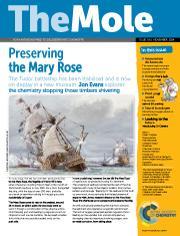February 2012
Innovation in science education - The Mole, Learn Chemistry and podcasts

An exciting start to 2012! At the ASE conference, the RSC launched two new products - The Mole, our new student magazine and Learn Chemistry, a fantastic new teaching and learning platform. The conference and exhibition showcased a host of innovations to support teaching and learning.
I attended some interesting and innovative sessions, from workshops on topics that are notoriously hard to teach, to the use of mobile technology in the classroom. I was amazed to see the variety of ways QR codes can be used in teaching and how willing students are to engage with using their mobile phones to access learning resources. It is much easier than you might think to develop resources to enhance the student learning experience. In this issue, Michael Seery guides us through the surprisingly straightforward process of developing and delivering podcasts for your students.
We have also seen welcome news from UCAS - despite the media hype that overall university applications are lower this year, (is this surprising after the rush over the last couple of years to try to avoid the fee hike?) chemistry applications have shown a 10% rise at some institutions. This surely shows that chemistry has a future in world development which is attractive to young people. It is our job as educators to provide an environment to cultivate this enthusiasm. A brilliant example of scientific advances and why we need to maintain the flow of chemists comes from Jan-Willem Bos. He shows how waste heat can be turned into electricity with the help of clever nanocomposite materials.
Finally, Vanessa Kind shares a concern that many of our chemistry teachers are non-specialists and some hold misconceptions about basic chemical principles. She urges that their subject knowledge is developed through appropriate government funded training, so they can support and nurture our school students who will become the chemists of the future.









No comments yet